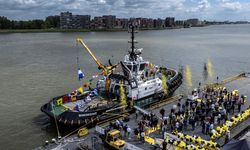This initiative, outlined in a joint statement by the Ministry of Industry and Information Technology and four other key departments, aligns with Beijing's commitment to future-proof its industrial complex by prioritizing sectors crucial in the global effort to reduce emissions.
Currently, China's shipyards have already produced more than 50% of the world's ships in the first 11 months of 2023. However, the shipbuilding landscape is on the verge of significant transformation, as fleet owners shift from oil-powered vessels to those running on cleaner fuels to meet the International Maritime Organization's emission-free target around 2050.
In the past year, orders for ships powered by cleaner LNG have surged to nearly 40% of the total, up from approximately 15% in 2019, as reported by BloombergNEF. Green methanol, a fuel with minimal lifetime emissions, has witnessed orders more than doubling in the current year, indicating a growing demand for sustainable maritime solutions.
China's ambitious plan goes beyond the construction target for vessels using cleaner fuels. The country also aims to accelerate research and design efforts for innovative ship types fueled by liquefied ammonia, hydrogen, and even carbon dioxide. Notably, a unit of China State Shipbuilding Co. has secured contracts exceeding $1 billion to build methanol container ships for A.P. Moller-Maersk A/S, according to local media reports earlier this month.
As China positions itself at the forefront of the green transition in shipbuilding, the global maritime industry is poised for a substantial shift towards sustainability. Stay tuned for updates on China's advancements in eco-friendly ship construction and the broader implications for the international shipping landscape.






